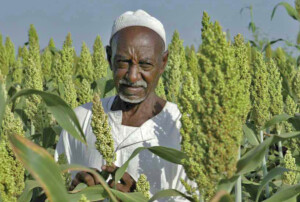Darfur refugees in Chad: ‘No peace without security, justice’
According to Darfuri refugees residing in eastern Chad camps, there can be no peace without security or justice.
“First, we need security. Without security, there can be no voluntary return, justice, nor compensation,” Sheikh Mohamed Dafallah, coordinator of the Darfuri refugees in eastern Chad, said in an interview with Radio Dabanga earlier this week, held as part of the current transitional justice programme.
 Sudanese refugees in an eastern Chad camp (Peter Biro / IRC)
Sudanese refugees in an eastern Chad camp (Peter Biro / IRC)
According to Darfuri refugees residing in eastern Chad camps, there can be no peace without security or justice.
“First, we need security. Without security, there can be no voluntary return, justice, nor compensation,” Sheikh Mohamed Dafallah, coordinator of the Darfuri refugees in eastern Chad, said in an interview with Radio Dabanga earlier this week, held as part of the current transitional justice programme.
Sheikh Yahya El Nadeef, head of the Kounongou refugee camp, also conditioned security and justice for the realisation of peace.
“All those wanted by the International Criminal Court (ICC) must be sent to The Hague,” El Nadeef said. “Then security must be provided. Rebels and militiamen alike must be disarmed. The carrying of weapons must be limited to security forces.”
Sheikh Dafallah affirmed that “the handing over of the five people indicted by the ICC, including deposed President Omar Al Bashir, is the main priority for the Darfuri refugees”.
He further pointed the importance of special courts in Darfur where “each person who has committed a crime against innocent citizens since 2003” should be tried. “These internal courts are to be transparent and fair, and to be monitored by the victims.”
The refugees also demand the establishment of land courts in Darfur which will deal with grievances over land, especially hawakeer (land traditionally used by a particular community).
Special land committees are to be formed. They should be made up of those affected by the war (refugees, displaced people, and native administration leaders) and work together with the courts to resolve problems concerning new settlers, and the ownership and use of farmland and pastures.
The victims must be compensated collectively and individually, Dafallah stated.
Sheikh El Nadeef called for the return of refugees and displaced people to their places of origin first. “After this, each affected person can determine his losses and request the appropriate compensation.”
He emphasised that reconciliation between the various components of society is important. “Yet, this comes after justice has been done, and the victims have received compensation. When security has been restored, it is possible to talk about reconciliation.”
Radio Dabanga’s editorial independence means that we can continue to provide factual updates about political developments to Sudanese and international actors, educate people about how to avoid outbreaks of infectious diseases, and provide a window to the world for those in all corners of Sudan. Support Radio Dabanga for as little as €2.50, the equivalent of a cup of coffee.












 and then
and then